
What do your car dashboard warning lights mean?
Your car dashboard can light up with a number of warning lights or symbols to indicate various problems with the car. When you turn your car’s ignition, all of the dashboard lights should temporarily illuminate to indicate that they’re working correctly - if they remain on you may have an issue that needs to be resolved.
Your car dashboard lights will indicate that something is wrong, and the colour of the light will indicate how serious the problem. Red warning lights are the most serious, whilst amber, orange and other colours are generally less serious, but may still need looking at by a professional. Our guide explains the most common dashboard warning lights and what they mean. If you can’t see the dashboard light you’re looking for, please refer to your owner manual.
Car dashboard symbols and meanings

Brake system warning light
You will see the brake warning light when the handbrake is on. If the symbol is visible after the handbrake is released, there has been a loss of hydraulic pressure on one side of the brake system or there is a leak somewhere in the brake system, resulting in the level of fluid in the master cylinder being dangerously low.

ECU/engine warning light
An illuminated engine warning light indicates there is a general fault with a part of your car’s engine. You may notice other issues when driving a vehicle if the light is illuminated, such as reduced power if the car has gone into ‘safe mode’ or lag as you press the accelerator. If your engine warning light is illuminated it is recommended that you get a professional to look at the car as soon as possible, as driving could be dangerous and cause further damage.

Airbag warning light
An illuminated airbag warning light indicates that there is an issue with the vehicles airbag system. If the airbag isn’t functioning correctly, it could fail to go off in the case of an accident or deploy without warning, potentially causing injury or a collision.

Power steering warning light
Your power steering light, otherwise referred to as an EPAS light, illuminates when there is a problem detected with the car’s steering system. When the system fails and the light illuminates, the steering could go extremely heavy, making it much more difficult to turn the car. This is a major issue at high speeds when you may need to quickly change direction and the car shouldn’t be driven if the power steering isn’t functioning correctly.
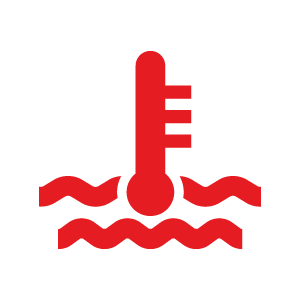
Engine temperature warning light
If your engine is overheating, you may see the engine temperature warning light appear on your dashboard. The most likely cause of an engine temperature warning is the coolant levels are running low, which you should be able to check by taking a look under the bonnet and fill up to the appropriate level. On the other hand, it could be something more serious such as a head gasket failure or a coolant leak, which could be more expensive to repair.

Battery charge warning
The warning light should illuminate for a few seconds when the car is first turned on, but if it remains on there could be a problem with the electrical system. The warning light indicates that there is a lack of power to the car’s charging system or it is not charging properly.
Usually, it means there is a problem with the battery, alternator, or loose cables in the engine. If it is a problem with the car’s alternator drive belt, it could cause issues to other parts of the engine such as the power steering and coolant pump.
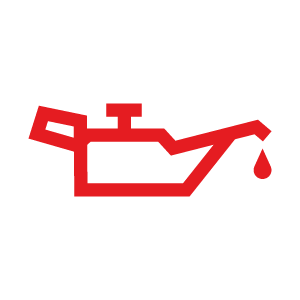
Oil warning light
When the engine oil light illuminates, it indicates that there has been a loss of oil pressure or the oil temperature is too high. You may notice that there is a sudden loss of engine power or unusual noises from the engine if this is the case.
Oil is what lubricates the engine, therefore if there is a problem with the oil being pumped around your engine it could cause it to overheat and cause damage which is costly to repair. It is recommended that the car isn’t driven if there is an oil-related problem and the car should be seen to by a professional as soon as possible.
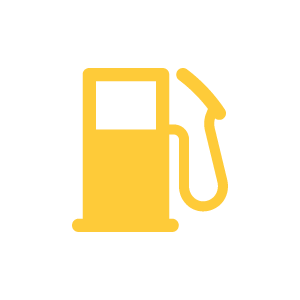
Low fuel warning light
You will see the low fuel warning light illuminate when your fuel tank drops below a certain level. The level that the warning light appears on will vary depending on the manufacturer, although it is generally when there are between 30-70 miles remaining. The light illuminates to make the driver aware that they’re running low on fuel and need to fill up at a fuel station.
If your fuel gauge is declining at a faster rate than you’d expect, you may have a leak or the on-board computer could be telling the engine to use more fuel than it needs. If there is a leak you may see fuel on the floor beneath where your car is parked, whereas if there’s a problem with the car’s computer you will need to get this checked by a professional.
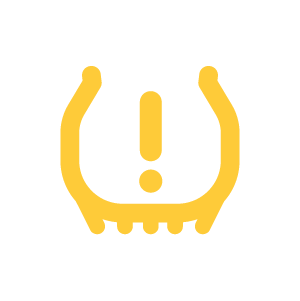
Tyre pressure warning light
A tyre pressure warning light illuminates when the tyre pressure monitoring system recognises a drop in pressure. Driving with a tyre that is underinflated can cause excessive tyre wear and possible tyre failure. When the light illuminates you should pull over where safe to do so and check all tyre pressures.

Traction control light
The traction control warning light is commonly seen when the car temporarily loses grip, usually in bad weather or when accelerating too quickly. It tells the driver that the car is close to the limit of grip. If the traction control system is turned off by the driver, you will see the light illuminated on your dashboard. If you haven’t turned off the traction control and the light is permanently illuminated, there may be an issue with the system that needs to be checked by a professional.

Transmission temperature warning
The transmission temperature warning light indicates the transmission temperature is higher than normal. If this is the case, it can seriously damage the gearbox and reduce its lifespan. You shouldn’t continue to drive if the warning light illuminates as it could result in the transmission failing, potentially putting yourself and other road users at risk, and causing further damage to the car.

Screen wash warning light
When the reservoir of modern cars is running low on washer fluid, you will see the screen wash warning light illuminate. When the light illuminates you should check the level of washer fluid and fill it up to the recommended level. If there is no fluid in your car, there is no way to remove dirt from your front and rear windows while driving, which could result in an accident. Furthermore, you will fail your MOT if there is no fluid in the system when the test is taken.

Glow plug warning light (diesel only)
Diesel engines require glow plugs to heat up in order to get the engine running. If the glow plug warning light illuminates on your dashboard, you could have a problem with the glow plugs which can cause issues with the efficiency of the engine and starting the car. Ignoring glow plug issues could result in the engine being damaged, making it sound rough and not run as efficiently as it should.
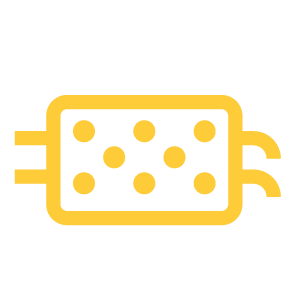
Diesel particulate filter warning light (diesel only)
Your car will illuminate the diesel particulate filter (DPF) warning light when the filter is blocked due to a build-up of soot. In most cases, it will simply need you to drive at a higher speed where the temperature of the exhaust will reach higher levels and burn the soot away. In worse cases, you may need to buy a new DPF which could be costly.
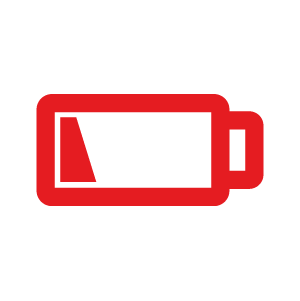
Low battery warning light (electric only)
The low battery warning light works in a similar way to the low fuel warning lights on petrol and diesel cars. You will see the low battery light illuminate on your dashboard when your car’s battery drops below a certain level, reminding you that you will need to re-charge the battery shortly.
Related articles
What our customers think





